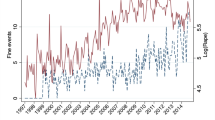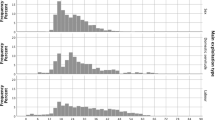Abstract
A lively drug policy debate is going on in the UK, and a central theme emerging is the punishment of drug offenders. The main contributing voices draw attention to the largely futile position of prosecuting offenders through the criminal justice system who are drug addicted and/or who are caught in possession of small quantities of drugs for personal use. This paper adds to this discussion by reporting findings from observations carried out in London Magistrates’ Courts. It notes the relatively high prevalence of small quantity drug possession cases that appeared before the courts over the study days, and questions the value of this type of crime arriving here in the first place. It examines the resultant financial penalties that are most commonly dispensed, and asks whether they can be reasonably justified. It states these are harsh and depriving given the already economically disadvantaged status of most defendants. In addition, case details revealed issues of policing approach involving ‘stop and search’ and the variable application of police discretion. The paper calls for thought to be given to the damage caused to peoples’ lives through pursuing criminalising drug policies, and to the time and economic cost to stretched policing and criminal justice resources. It suggests we learn lessons from other European jurisdictions who assign drug possession for personal use cases, to an arm of the prosecution service where they are processed as ‘out-of-court’, ‘administration offences’.
Similar content being viewed by others
Notes
The Liberal Democratic party laid out ideas for a revised drug policy favouring the ‘depenalisation’ of some drugs at their 2011 autumn party conference (Hoyle 2011), and at the time of writing a Home Affairs Select Committee was carrying out an inquiry into UK drug policy.
Magistrates’ Courts adjudicate on ‘summary’ and ‘triable either way’ (TEW) offences. Cannabis possession charges pertaining to small quantities is within the jurisdiction of the Magistrates’ Court, but cocaine and heroin possession are TEW offences and can be sent to the Crown Court for trial and/or sentencing.
See the Drugscope web document for the specific drug substances that sit within the different A to C classifications (Drugscope 2012 www.drugscope.org.uk).
The 2011 drug offences figures were obtained from the Ministry of Justice under a Freedom of Information Act request (Source: Justice Statistics Analytical Services - Ministry of Justice).
It is possible the use of ‘immediate custody’ can be explained by other factors such as previous ‘failure to surrender’ etc. More nuanced breakdowns of the data are not available, and as such any reading of it must be done with caution.
During the time cannabis sat as a Class C drug in the UK, it remained illegal but was effectively decriminalised. Instead of prosecutions through the courts, ‘cannabis warnings’ were issued and a person could receive more than one warning without further penalty (Drugscope 2009).
Proceedings in the Magistrates’ Courts are abjudicated by either a legally qualified District Judge, or a panel of three volunteer magistrates (Sanders et al 2010).
‘Cannabis warnings’, Penalty Notices for Disorder (PNDs), cautions etc. are all options available in the policing of cannabis possession (Drugscope 2009).
The ‘Coroners and Justice Act 2009’ makes compliance to the sentencing guidelines more fixed than previously, with any deviation from them requiring a reason (Roberts 2010: 142).
A conflicting view has emerged on the success of Portugal’s drug policy (see Hughes and Stevens 2012).
References
ACPO (2009) ACPO Guidance on Cannabis Possession for Personal Use: Revised Intervention Framework. Association of Chief Police Officers http://www.drugscope.org.uk/Resources/Drugscope/Documents/PDF/virtuallibrary/ACPOCannabisWarnings09.pdf. Accessed 8 June 2012.
Allan, A., Allan, M. M., Giles, M., Drake, D., & Froyland, I. (2005). An observational study of bail decision-making. Psychiatry, Psychology and Law, 12(2), 319–333.
Ashworth, A., & Redmayne, M. (2010). The criminal process (4th ed.). Oxford: Oxford University Press.
Ashworth, A., & Roberts, R. (2012). Sentencing: Theory, principle and practice. In M. Maguire, R. Morgan, & R. Reiner (Eds.), The Oxford handbook of criminology (5th ed.). Oxford: Oxford University Press.
Baldwin, J. (2008). Research on the Criminal Courts. In R. D. King & E. Wincup (Eds.), Doing research on crime and justice (2nd ed.). Oxford: Oxford University Press.
Ballotta, D., Bereron, H., & Hughes, B. (2008). Cannabis Control in Europe, in EMCDDA A Cannabis Reader: Global Issues and Local Experiences. EMCDDA: Lisbon.
Bear, D., & Shiner, M. (2011). Strange Police Priorities in a Time of Austerity. The Guardian 29 July.
Bewley-Taylor, D., Hallam, C., & Allen, R. (2009). The Incarceration of Drugs Offenders: An Overview. The Beckley Foundation Drug Policy Programme. www.idpc.net.
Bowling, B., & Phillips, C. (2007). Disproportionate and discriminatory: reviewing the evidence on police stop and search. Modern Law Review, 70(6), 936–961.
Burgess, R. G. (1984). In the field: An introduction to field research. London: Unwin Hyman.
Connolly, J. (2009). Reports Examine Effects of Decriminalisation of Drugs in Portugal. DRUGNET: Ireland. http://www.drugsandalcohol.ie/12204/1/Drugnet_30.pdf accessed 29 June 2012.
Crown Prosecution Service (2010). The Code for Crown Prosecutors. CPS Police Directorate www.cps.gov.uk.
Department for Constitutional Affairs. (2006). Delivering simple, speedy, summary justice. UK: Department for Constitutional Affairs.
Drugscope (2009) Cannabis Laws: Explaining the Cannabis Laws and their Enforcement. www.drugscope.org.uk accessed 1 July 2011.
Drugscope (2012). What are the UK Drug Laws www.drugscope.org.uk accessed 1May 2012.
EMCDDA. (2009a). Drug Offences: Sentencing and other outcomes. Lisbon: European Monitoring Centre on Drugs and Drug Addiction.
EMCDDA. (2009b). Drug offences: Sentencing and other outcomes: Online annex results by country. Lisbon: European Monitoring Centre on Drugs and Drug Addiction.
EMCDDA. (2011). TNI-EMCDDA Expert seminar on threshold quantities. Lisbon: European Monitoring Centre on Drugs and Drug Addiction.
H.M. Government (2003). The Criminal Justice Act 2003. Her Majesty’s Stationary Office.
Greenwald, G. (2009). Drug decriminalisation in Portugal: Lessons for creating fair and successful drug policies. Washington: Cato Institute.
H. M. Government. (2010). Drug strategy 2010: Reducing demand, restricting supply, building recovery: Supporting people to live a drug free life. London: Home Office.
Harcourt, B. E. (2001). The Illusion of Order: The False Promise of Broken Windows Policing. Cambridge: Harvard University Press.
Harris, G. (2010). Sentencing for Drug Offences in England and Wales. Series on Legislative Reform of Drug Policies. International Drug Policy Consortium. www.idpc.com.
Hood, R. (1992). Race and Sentencing: A Study in the Crown Court. Oxford: Clarenden Press.
House of Commons Science and Technology Committee. (2006). Drugs Classification: Making a Hash of It. London: The Stationary Office.
Hoyle, E. (2011). It’s time for the UK government to fully review drug policy. British Medical Journal, 343, d5235.
Hughes, C., & Stevens, A. (2010). What can we learn from the Portuguese decriminalisation of illicit drugs. British Journal of Criminology, 50(6), 999–1022.
Hughes, C., & Stevens, A. (2012). A resounding success or a disastrous failure: re-examining the interpretation of evidence on the Portuguese decriminalisation of illicit drugs. Drug and Alcohol Review, 31, 101–113.
International Centre for Science in Drugs Policy (2010). The Vienna Declaration www.viennadeclaration.com accessed 4 Sept. 2011.
Jehle, J.M., & Wade, M. (2006). Coping with Overloaded Criminal Justice Systems: The Rise of Prosecutorial Power Across Europe. Springer Berlin Heidelberg.
Judicial Studies Board (2009). Reporting Restrictions in the Criminal Courts. www.judiciary.gov.uk accessed 8 June 2012.
Kainulainen, H. (2006). Sanction Practices in Drug Offences. Finland: Research Report 219, National Research Institute of Legal Policy.
Kainulainen, H. (2009). Criminal Control of Drug Users. Research Report 245, National Research Institute of Legal Policy: Finland.
Lewis, C. (2006). The Prosecution Service Function within the English Criminal Justice System, in J. M. Jehle and M. Wade (Eds.) Coping with Overloaded Criminal Justice Systems: The Rise of Prosecutorial Power Across Europe. Springer Berlin Heidelberg.
Lloyd, C. (2008). UK cannabis classification: a flawed debate. Lancet, 371(9609), 300–301.
May, T., Warburton, H., Turnbull, P. J., & Hough, M. (2002). Times They are a Changing: Policing of Cannabis. UK: Joseph Rowntree Foundation, York.
May, T., Duffy, M., Warburton, H., & Hough, M. (2007). Policing Cannabis as a Class C Drug: An Arresting Change. UK: Joseph Rowntree Foundation.
McLeod, J., & Hickman, J. (2010). How ideology shapes the evidence and the policy: what do we know about cannabis use and what should we know. British Medical Journal, 105(8), 1326–1330.
Mill, J.S. (1895[2005]). On Liberty. Cosimo Classics: New York.
Ministry of Justice. (2010). ‘Breaking the Cycle: Effective Punishment, Rehabilitation and Sentencing of Offenders. London: Home Office.
Ministry of Justice (2011a). Criminal Justice Statistics Quarterly Update to December 2010. Ministry of Justice Statistics Bulletin. www.justice.gov.uk accessed 14 June 2012.
Ministry of Justice (2011b). Statistics on Race and the Criminal Justice System 2010. Ministry of Justice. Online report.
Newburn, T., & Reiner, R. (2012). ‘Policing and the Police’, in M. Maguire, R. Morgan and R. Reiner, R. (Eds.) The Oxford Handbook of Criminology (5th ed.). Oxford University Press: Oxford.
Packer, H. L. (1968). The Limits of the Criminal Sanction. Stanford: Stanford University Press.
Police Foundation. (2000). Drugs and the Law: Report of the Independent Inquiry into the Misuse of Drugs Act 1971. London: The Police Foundation.
Povey, D. (Ed.), Mulchandani, R., Hand. T. and Kaur Panesar, K. (2011) Police Powers and Procedures, England and Wales 2009/10. Home Office Statistical Bulletin 07/11. London: Home Office.
Prison Reform Trust (2011). Bromley Briefings Prison Factfile. www.prisonreformtrust.org accessed 14 June 2012.
Raine, J. W., & Dunstan, E. (2009). How well do sentencing guidelines work: equity, proportionality and consistency in the determination of fine levels in the magistrates’ courts of England and Wales. Howard Journal of Criminal Justice, 48(1), 13–36.
Raynor, P. (2012). Community penalties: Probation and offender management. In M. Maguire & R. Morgan (Eds.), The Oxford Handbook of Criminology (5th ed.). Oxford: Oxford University Press.
Reiner, R. (2010). The Politics of the Police (4th ed.). Oxford: Oxford University Press.
Release (2011). Time for Better Laws www.release.org.uk accessed 30 September 2011.
Roberts, J. (2010). Sentencing guidelines in England and Wales: a review of recent developments. Criminal Justice Matters, 82, 41–42.
Roberts, J. (2011). Sentencing guidelines and judicial discretion: evolution of the duty of courts to comply in England and Wales. British Journal of Criminology, 51(6), 997–1013.
Rock, P. (1991). Witnesses and space in a crown court. British Journal of Criminology, 31(3), 266–279.
Ruggiero, V. (2000). Crime and Markets. Oxford: Oxford University Press.
Sanders, A., Young, R., & Burton, M. (2010). Criminal Justice (3rd ed.). Oxford: Oxford University Press.
Sentencing Council (2011). Analysis and Research Bulletins—Drug Offences. Office of the Sentencing Council. www.sentencingcouncil.judiciary.gov.uk.
Sentencing Council (2012). Drug Offences Definitive Guideline. Sentencing Council www.sentencingcouncil.org.uk accessed 14 June 2012.
Sentencing Guidelines Council (2008). Magistrates’ Court Sentencing Guidelines. Sentencing Guidelines Council. www.sentencingcouncil.org.uk/guidelines accessed 4 July 2011.
Smith, K., & Flatley, J. (Eds.). (2011). Drug Misuse Declared: Findings from the 2010/11 British Crime Survey, England and Wales. Home Office Statistical Bulletin 12/11. London: Home Office.
Stevens, A. (2011). Drugs, Crime and Public Health: The Political Economy of Drug Policy. Abingdon: Routledge.
Tarling, R. (2006). Sentencing in magistrates courts revisited. Howard Journal of Criminal Justice, 45(1), 29–41.
Thomas, D. (2003). Judicial discretion in sentencing. In L. Gelsthorpe & N. Padfield (Eds.), Exercising Discretion: Decision-making in the Criminal Justice System and Beyond. Cullompton: Willan Publishing.
Trace, M., Klein, A., & Roberts, M. (2004). Reclassification of Cannabis in the UK. http://beckleyfoundation.org.
Transform (2011). Illegal Drugs: The Problem is Prohibition The Solution is Control and Regulation. Transform Drug Policy Foundation www.tdpf.org.uk eport 2Accessed 30 September 2011.
Wacquant, L. (2008). Urban Outcasts: A Comparative Sociology of Advanced Marginality. Cambridge: Polity Press.
Wade, M. (2009) Prosecutors and Drug Policy: A Tale of Six European Systems. Utah Law Review, 153–174.
Warburton, H., May, T., & Hough, M. (2005). Looking the other way: the impact of reclassifying cannabis on police warnings, arrests and informal action in England and Wales. British Journal of Criminology, 45(3), 113–128.
Ward, J. (2011). Policing public drug nuisance through the anti-social behaviour legislation: questions and contradictions. European Journal on Criminal Policy and Research, 17(4), 323–341.
Ward, J., & Thom, B. (2009). Drug Consumption in London- A City of Diverse and Changing Scenes, in I. Eisenbach-Stangl; J. Moskalewicz, and B. Thom (Eds.) Two Worlds of Drug Consumption in Late Modern Societies. Farnham: Ashgate.
Young, P. (1989). Punishment, money and a sense of justice. In P. Carlen & D. Cook (Eds.), Paying for Crime. Milton Keynes: Open University Press.
Author information
Authors and Affiliations
Corresponding author
Rights and permissions
About this article
Cite this article
Ward, J. Punishing Drug Possession in the Magistrates’ Courts: Time for a Rethink. Eur J Crim Policy Res 19, 289–307 (2013). https://doi.org/10.1007/s10610-012-9191-1
Published:
Issue Date:
DOI: https://doi.org/10.1007/s10610-012-9191-1




